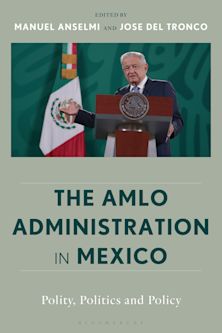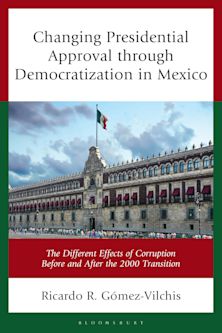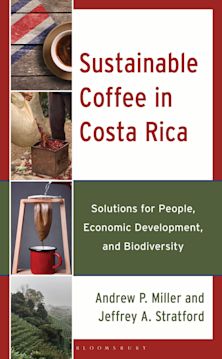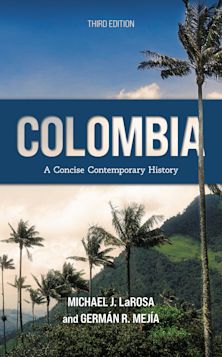Latin America's Radical Left
Challenges and Complexities of Political Power in the Twenty-first Century
- Textbook
Latin America's Radical Left
Challenges and Complexities of Political Power in the Twenty-first Century
- Textbook
This product is usually dispatched within 3 days
- Delivery and returns info
-
Free CA delivery on orders $40 or over
Description
This timely book explores the unique challenges facing the left in Latin America today. The contributors offer clear and comprehensive assessments of the difficult conditions and conflicting forces that have brought to power the current leftist regimes in Latin American and the Caribbean and are shaping their development. Avoiding the widely accepted but simplistic dichotomy of “good” and “bad” left or democratic and antidemocratic left, the book first sets the theoretical and historical context for understanding the rise of the left in the region. It then provides case studies of the radical left in power in Venezuela, Bolivia, and Ecuador and its influence in Nicaragua, El Salvador, and Cuba. Thematic chapters consider social and labor movements and debates over problems arising from the democratic transition to socialism. The book points to concrete circumstances in which theoretical issues related to reform and change have played out in nations where the left is in power. These include prioritization of social over economic objectives, the role of the state in the democratic road to socialism, and ecological as opposed to developmentalist strategies. Finally, the book examines the opposition to radical governments in power coming not only from the right but also from movements to their left. With its balanced and thorough assessment, this study will provide readers with a deep and nuanced understanding of the complexity of the political, economic, and sociocultural reality of contemporary Latin America and the Caribbean.
Contributions by: Marc Becker, Roger Burbach, George Ciccariello-Maher, Héctor M. Cruz-Feliciano, Steve Ellner, Federico Fuentes, Marcel Nelson, Hector Perla Jr., Camila Piñeiro Harnecker, Thomas Purcell, Diana Raby, William I. Robinson, and Kevin Young
Table of Contents
William I. Robinson
Introduction: Complexities of the Twenty-First-Century Radical Left in Power
Steve Ellner
Part I: Theoretical, Historical and International Background
Chapter 1: The Radical Left's Turbulent Transitions: An Overview
Roger Burbach
Chapter 2: Brief Hypotheses on the State, Democracy, and Revolution in Latin America Today
Diana Raby
Chapter 3: Institutional Conflict and the Bolivarian Revolution: Venezuela’s Negotiation of the Free Trade Area of the Americas
Marcel Nelson
Part II: The Twenty-First-Century Radical Left in Power in Venezuela, Bolivia, and Ecuador
Chapter 4: Social and Political Diversity and the Democratic Road to Change in Venezuela
Steve Ellner
Chapter 5: “Bad Left Government” versus “Good Left Social Movements”? Creative Tensions within Bolivia’s Process of Change
Federico Fuentes
Chapter 6: Rafael Correa and Social Movements in Ecuador
Marc Becker
Part III: Influences of the Twenty-First-Century Radical Left in Nicaragua, El Salvador, and Cuba
Chapter 7: The Twenty-First-Century Road to Socialism in El Salvador and Nicaragua: Making Sense of Apparent Paradoxes
Hector Perla Jr. and Héctor M. Cruz-Feliciano
Chapter 8: Cuba’s New Socialism: Different Visions Shaping Current Changes
Camila Piñeiro Harnecker
Part IV: Economy, Society, and Media
Chapter 9: The Political Economy of Social Production Companies in Venezuela
Thomas Purcell
Chapter 10: Constituent Moments, Constitutional Processes: Social Movements and the New Latin American Left
George Ciccariello-Maher
Chapter 11: The Good, the Bad, and the Benevolent Interventionist: U.S. Press and Intellectual Distortions of the Latin American Left
Kevin Young
Chapter 12: Concluding Observations: The Twenty-First-Century Radical Left and the Latin American Road to Change
Steve Ellner
Product details
| Published | Mar 24 2014 |
|---|---|
| Format | Paperback |
| Edition | 1st |
| Extent | 306 |
| ISBN | 9781442229495 |
| Imprint | Rowman & Littlefield Publishers |
| Illustrations | 2 Tables |
| Dimensions | 223 x 149 mm |
| Series | Latin American Perspectives in the Classroom |
| Publisher | Bloomsbury Publishing |
Reviews

ONLINE RESOURCES
Bloomsbury Collections
This book is available on Bloomsbury Collections where your library has access.


































